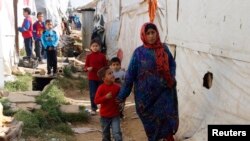The Lebanese government has cut back sharply on the number of Syrian refugees it is allowing into the country, the United Nations representative in Lebanon said on Saturday.
Lebanon has the highest per capita concentration of refugees in the world, with one in four residents a refugee, many of them living in the poorest areas.
The government has said it cannot cope with the more than a million Syrians and has asked for funds to help look after them.
Ninette Kelley, representative of the United Nations High Commissioner for Refugees in Lebanon, said: “Many fewer people are being allowed in than would normally be coming in to get refugee status.”
Following a constant increase in refugees to Lebanon since the start of 2012, United Nations figures show a decrease of around 40,000 refugees since the end of September.
Humanitarian reasons
Social Affairs Minister Rashid Derbas said in comments published on Saturday in Lebanon's Al-Akhbar newspaper that “Lebanon is no longer officially receiving any Syrian refugees,” except with those with pressing humanitarian reasons.
“Anyone who passes the Syrian-Lebanese border will be questioned and should have a humanitarian reason for their entry. This will be decided by the Interior and Social Affairs ministries,” he said without giving further details.
Reuters could not immediately reach the Social Affairs Ministry and Kelley said “there has been no publication of the criteria used” at the border.
Resentment against Syrians has grown in Lebanon with many complaining that refugees are taking jobs, driving down wages, overloading schools and hospitals, and even worsening an electricity shortage which pre-dates the war in Syria.
Syrians have long faced discrimination and abuse in Lebanon and beggars now walk the streets of Beirut.
Kelly has called for renewed investment in Lebanese infrastructure to help the country manage the influx and has said Lebanese host communities deserve support for coping with the refugee burden.
Sunni refugees
Politicians also fret about the mainly Sunni Muslim refugees' impact on Lebanon's fragile sectarian balance, in which power is carefully divided between Christians, Shi'ite Muslims, Sunnis, and other, smaller groups.
More than 60 years ago, it took in tens of thousands of Palestinian refugees from the war of Israel's creation. They have now grown to hundreds of thousands, their camps turned into permanent, squalid slums.
The militarization of Palestinian camps is also widely seen as a catalyst of Lebanon's own 15-year civil war, which only ended in 1990.
Syria's 3.2 million refugees, many also in Turkey and Jordan, are fleeing a three-year civil war which has killed nearly 200,000 people, according to U.N. figures.
Both the Syrian government and insurgent groups are accused by rights groups of killing civilians and destroying homes.





